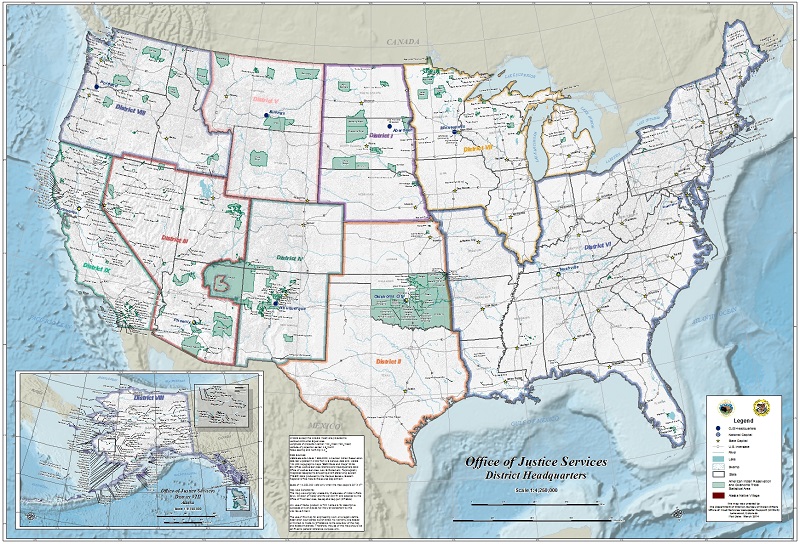Field Operations Directorate is responsible for administrating, developing, and implementing organizational objectives for the Divisions of Law Enforcement and Corrections. These programs integrate key national goals, priorities, and values. Field Operations programs also provide a great deal of technical assistance to BIA direct service programs and Indian tribes relating to public safety; and stress accountability and a commitment to continuous improvements to meet the organizations’ mission.
The BIA-OJS-Field Operations Directorate is comprised of the following nine Districts:
- District I is located in Aberdeen, SD and covers ND, SD and NE;
- District II is located in Muskogee, OK and covers KS, OK, and TX;
- District III is located Phoenix, AZ and covers AZ, NV, and UT;
- District IV is located in Albuquerque, NM and covers CO and NM;
- District V is located in Billings, MT and covers MT and WY;
- District VI is located in Nashville, TN and covers the entire Eastern Region;
- District VII is located in Bloomington, MN and covers MN, IA, IL, MI, and WI;
- District VIII is located in Vancouver, WA and covers ID, OR, WA, and AK; and
- District IX is located in Sacramento, CA and covers the state of California.
VICTIM ASSISTANCE
Victim Assistance supports the mission of OJS by providing services and assistance to victims of crime in Indian Country. In conjunction with law enforcement, the Victim Specialists provide information, referrals, notification, and services to identified crime victims. The Victim Specialists function and navigate during stressful and traumatic events to provide appropriate and effective responses to victims. Based upon the victims' needs and assessment, services may include on scene response when appropriate, crisis intervention, crisis counseling and emotional support. The Victim Specialists have a vast array of skills which assist in the reduction of trauma, assisting with immediate needs and assisting with safety concerns when initial contact is made with victims. Other types of assistant and follow up include a broad range of services such as: explanation of the criminal justice process; education of common reaction to trauma and coping skills; emergency fund assistance; protection orders; Victim Impact Statements; court accompaniment; and Crime Victims' Compensation. The goal of victim assistance is to provide a continuum of services for victims from the reporting of a crime on through the criminal justice process. The Victim Specialists are bound by a professional Code of Conduct for victim service providers and treat all victims with dignity and respect while protecting their individual privacy. The Victim Specialists also follow the guidance found in the U.S. Attorney's Guidelines for Victim Witness Assistance (2011) which sets forth the mandatory services to victims for federal law enforcement agencies (Victims' Rights and Restitution Act, 42 U.S.C. 10606). The type of crime victims the Victim Specialists serve are all inclusive and can range from violent crime to property crime. The Victim Specialists view their role and responsibilities as part of an overall team effort to ensure the delivery of quality victim services in the tribal communities that they serve.



